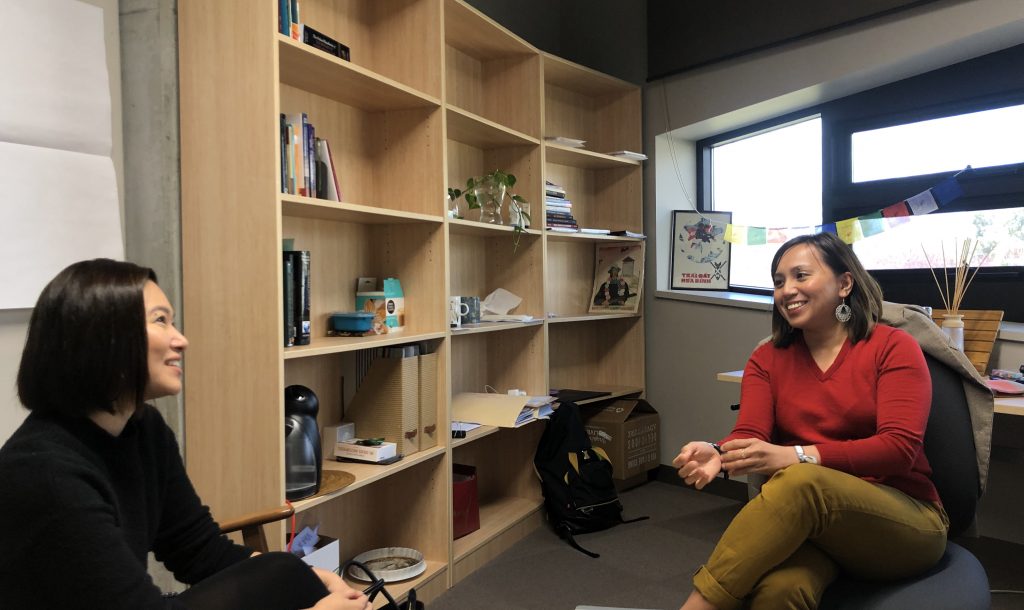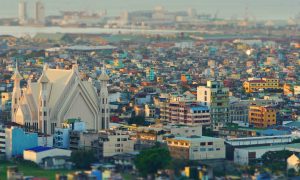In this second episode of our second series of the Philippines beyond clichés, the topic of discussion is sexism. Is the Philippines a sexist society? Associate Professor Nicole Curato of the University of Canberra’s Centre for Deliberative Democracy and Global Governance speaks with Dr Maria Tanyag, a research fellow in the Coral Bell School of Asia Pacific Affairs, in order to unpack the complexities of this question. How can we “understand or disaggregate gender equality issues based on multiple overlapping issues of inequality based on class, religion, sexuality, ethnicity, and also geographic locations” and consider the potential of intersectionality across marginalised groups in Filipino society? As always, we provide the transcript for this episode below.
Nicole Curato [NC]: [00:46] Thank you, Maria for welcoming us in your office here at the ANU and the cliche we will unpack today is about sexism. Is the Philippines a sexist country? So, the question may be straightforward because if you just listen to debates in the Senate and House of Representatives about divorce, so for our listeners, the Philippines is the only country in the world without divorce aside from Vatican City. Or when we listen to speeches of President Duterte, the answer to this question is quite straightforward, right? When a country gives licence to the head of state to order the military to shoot female rebels in the vagina, when the crowd laughs with the president who admitted to ogling Vice President Leni Roberdo’s legs, then obviously this is a freaking sexist society. But also, there’s an irony here. When we look at data, the Philippines consistently lands in the top 10 of countries that do well in the Global Gender Gap Index. So, we rank alongside progressive countries like Iceland, Sweden, and Finland. So, obviously there’s something complicated going on here so as a feminist and International Relations scholar, help us make sense of this. Is the Philippines a sexist country?
Maria Tanyag [MT]: [02:13] Thank you so much, Nicole. I’m very happy and I feel very privileged to be joining you in this conversation. And you’re quite right. I think at this stage with the maturity of feminist movements globally and especially in the Philippines, I think we can go beyond the standard question of is the Philippine society and politics sexist or not. Because when we look at the growing body of evidence, it calls us to actually disaggregate gender equality issues because at the moment now we see a broad, wide, normative acceptance that gender equality matters. So, we have now global international legal frameworks that recognise gender equality is a fundamental indicator for building peaceful, more cohesive societies. And you’re quite right. The Philippines actually is a regional leader, the top country in the Asia Pacific when it comes to bridging gender equality gaps. But when we’re talking about the Global Gender Gap Index, it measures disparities between men and women, it rarely, or the measure, that index doesn’t adequately capture inequalities among women. And when we look at inequalities among women, that’s when we begin to understand or disaggregate gender equality issues based on multiple overlapping issues of inequality based on class, religion, sexuality, ethnicity, and also geographic locations. And so when we start unpacking and we look and focus on what can we make sense of when we’re talking about gender equality in relation to other axes of inequalities as I’ve mentioned. And in that we see that actually, while the Philippines has made progress in terms of promoting women’s political participation and economic participation, and we’ll get to that later on, we have actually had very little progress when it comes to issues that are so called doctrinal issues. So, feminist scholars have identified a broad pattern globally but significantly, the Philippines is a very relevant case study here because of strong elite religious which are both political and economic actors have managed to retain a very strong influence both in society and politics and economics over issues they recognise as doctrinal. And these issues are often around the preservation of the family, control over sexuality, and biological reproduction. In these issues we start to see that it’s not just men who are reversing as well as detrimenting progress for gender equality issues. But also it involves the complicity of women, in particular elite, conservative women in the country.
NC: [05:29] So actually yeah when I look at your body of work, intersectionality figures in a lot in that work. So of course I’ll ask you to define for us what intersectionality means but for me, this is most pronounced when we talk about women in politics. There’s a tendency to glamourise the status of female politicians in the Philippines. But if you look at them, come on they’re all from political dynasties. They usually take over the position of their fathers, their husbands, so do you think that’s something we should celebrate? Because when I look back at the reproductive health debates, women aren’t natural allies when it comes to progressive women’s issues, like what you said, a lot of them want to preserve conservative and sometimes quite oppressive views couched as family values.
MT: [06:15] Exactly. And this is global and we can unpack that later on so while the Philippines is exceptional because of its history and the ways in which authority has been defined and that’s why we get these opportunities for women to rise into power and be elected as presidents, but it’s a global problem and it’s something that we’re seeing elsewhere, this whole resurgence of maintaining traditional families or the protection of the family as part of maintaining national identity. But in the Philippines, it’s interesting and more perhaps in the region as well where we’ve actually seen women rise to higher levels of politics, where in many places, for instance in the ‘West’ you have not seen the same level. Women in the Philippines have managed to obtain greater percentage of parliamentary representation as you’ve mentioned. And we’ve also had very high labour force participation globally. But the irony is as you’ve mentioned, we have had two female presidents—and I’ve studied this for both my Masters and PhD—the irony is that we’ve had two women presidents but under the terms of both presidents, they have managed to actually block significant advancements in sexual and reproductive health. And we’re talking about Cory Aquino and Gloria Macapagal-Arroyo who both project very strong Catholic identities. And then in other studies we’ve shown that again we’re talking about political elites and families. These dynasties, the women inherit positions and so there is gender there but also class, right? And these ways in which often it is very hard for women in privileged positions to understand the barriers to bodily autonomy because they have those economic bases to begin with. For instance, the whole issue with the RH Bill has been that it was contentious more because it demands the state to provide access to services as well. And it’s because these is a reallocation of resources. It’s not just simply buying, because we do have condoms accessible but not everyone can afford that and that’s why it was so contentious because it deliberately asked government and the state to provide services. And that’s when it becomes challenging for the elite who are both religious, support very fundamentalist views on religion, because it also involves redistributing resources.
NC: [09:07] And there’s a class dimension. But I guess if you are in a fairly wealthy family in the Philippines, you can easily say, ‘Yeah, having eight children is great!’ But that’s also because you have an army of nannies who can help you raise your children while these women get top positions whether in government or in corporations. So, I think the message here, I agree with your reading here, we have to place in the foreground the intersectional dimensions of feminist politics in the Philippines. And yeah, I mean I think it’s a good way to pivot on a discussion on policies because we can also say that the polity context in the Philippines, and some people would say this actually that our laws for example when it comes to migrant workers sets the global standard and an implicit dimension—implicit or explicit dimension of this policy is to protect vulnerable migrant workers who are usually women, right? So recently President Duterte signed a law that requires government to publish and disseminate a handbook for Filipinos working overseas and this handbook tells migrant workers like both us their rights and responsibilities which should empower us against abusive employers. Now, ANU’s not an abusive employer. [laughter] Though academia in general, I think is quite abusive as an industry. But the law really is targeting migrant workers engaged in domestic labour, care, and hospitality industries which have particular vulnerabilities. But of course, policy design is different from policy practice. So, what’s the situation in the Philippines?
MT: [10:39] This is very interesting and actually, my goal has always been to show the connections between our conversations earlier around conservative religious ideology in the Philippines and how it restricts bodily autonomy. Because it has very much clear—for me—relevance and I try to show that with my research, in the ways in which women’s bodies through labour export and migration are also shaped in religious ideology and that’s how insidious it is because in a lot of the cases when you look at the promotion or how we fashion competitive advantage in the global labour market, it is really to emphasise that Filipino care workers are innately homemakers.
NC: Right. Docile, subservient.
MT: [11:31] Exactly. And a lot of scholars focusing on feminist and race politics here have emphasised that historically, we have positioned the country, the state has positioned itself as the best exporter of care workers. And it is always also couched in religion because Christianity, for instance, emphasises Virgin Mary and the importance of family to Filipinos and what has happened is in positioning all of that, we’ve actually also indirectly—positioning in the labour market—indirectly also privileged once more that conservative religious ideology of what makes a good woman, right? And that is a woman who is good at caring, who is good at being selfless, martyring herself in order to, you know, leaving her family in order to care for her—but the problem is that there are gaps.
[14:05] Despite the rhetoric of—and you’re right, we’ve got among the best policies and this is largely credited to the feminist movement, women’s movement. Not so much, not all the time, women in politics. But these progressive policies are often in clash with realities both nationally and global economy where even at the global level, that labour, especially domestic labour, is devalued. We still, up to now, hear a lot of abuses that are occurring and lack of protection. I know for a fact that Duterte even issued a statement, so you’re right that we have progressive policies, but he also mentioned in a statement, and I can give you the specific link to that, he mentioned that women should just carry contraception because rape comes with the territory. So if you go and work overseas as a woman migrant worker, especially again we know this trope when you go to the Middle East that there is a heightened risk of sexual violence. And so Duterte mentions, ‘You just have to deal with it on your own. Just have contraception.’ But these sort of pronouncements we see at the global level too when, for instance, with the Zika crisis, women are told to, ‘Well, just get contraception.’ Never mind the preexisting structural barriers to accessing contraception to begin with. First, it’s the stigma and the more imbibed control that women have where they would not want to access contraception because when you do that, then you’re assumed to be sexually promiscuous. There’s still all of that baggage. But then also that you do not have access all the time. Especially, if you still also have criminalisation of abortion in certain places. And what happens in the Philippines, again we’re notorious for this, is that we still have not solved issues around lack of access to abortion. [16:17] So, this is the broader picture that we’re seeing and it’s not as clear-cut as saying we’re sexist or not. Because actually we are making very good progress in terms of legislations and policies and women’s movements in the Philippines have historically been more solid or they have had strategic bargains that have resulted in specific policy outcomes. But the everyday realities are messy and for me, I really focus on the intersection between religion and economy in the Philippines and the ways in which we keep re-embedding a certain way of understanding which bodies matter and not.NC: [17:03] Well, speaking of messy realities and contentious issues about the use of the human body, the Philippines is also in the middle of heated debates about the Anti-Discrimination Bill. And there’s a huge catalogue of hate crimes targeted against LGBT communities in the Philippines. And I think for me, the most memorable is the case of Jennifer Laude, a trans woman who was killed by an American military personnel, Joseph Scott Pemberton, and Scott Pemberton was found guilty of homicide—not murder—and I remember the court said that he acted out of passion and obfuscation. And this gruesome homicide of a marine officer slaughtering a trans woman and dunking her head on a toilet bowl I think just crystallises how much hate there is. And we’re starting to see these stories again back on mainstream news. So, like what you said earlier, issues on gender is a global issue at the moment. It’s not peculiar to the Philippines, we see this around the world. We need not look far, sodomy is still a crime in Malaysia. So, I guess my question to you is what are the particularities of the LGBT debates in the Philippines? And also, how much of it is part of the global conversation?
MT: [18:16] Thank you for reminding me about that case. It’s just really brought to the fore not just class and gender but race too. And we need to really unpack that and the legacies of colonialism and imperialism in the Philippines. Because for me, the challenge for us is to really see the connections and to make visible all these connections because these are not isolated issues and we start to understand the violence that are inflicted on trans people. We see that it’s, like you said, it’s the ways in which bodies are violated/valued in very different ways. I might say something controversial but I think it’s something that I’m also processing. So, looking at my Facebook with the recent debates over the Anti-Discrimination Bill, because I’ve done work to understand gender in the peace process in the Philippines so I have connections with Muslim Moro groups or people from Moro areas and they are opposed to the Anti-Discrimination Bill. But I find that opposition even more peculiar. Because for me, one of the bases, the strong bases for advancing Moro rights in the Philippines is deeply connected to the struggle of LGBT people in the Philippines. And I really find it very difficult to read that the very same people who are claiming for recognition of their humanity are so easy to deny humanity for others. Without knowing that for a very long time, Moro people up until now are denied their rights or are recognised as second-class citizens in many places because of prejudice, because of religious discrimination. But here you see certain opposition because—among the specific things that I’ve read, and perhaps I’m in a bubble but I’ve seen it as well with not just Muslim religious groups but Catholic religious groups denying or criticising LGBT movement for demanding special rights without knowing that a lot of these, the right to self determination that Moro groups are also demanding from the state, are in the same continuum. It is demanding recognition for their humanity and the redistribution of resources for that.
Philippines beyond clichés series 1 #1: Catholic country
Jayeel Cornelio talks to Nicole Curato about the under-appreciated level of religious diversity in the Philippines.
NC: [21:13] I mean I think it’s the same in Australia as well when they had the equal marriage vote, right? So, a lot of minority communities who also have strong religious convictions, who are also discriminated in this society, are the same communities also that express horizontal violence against other communities that also claim for recognition. Which makes it a very tricky space to understand configurations of power. Are we imposing oppression towards each other whereas we should be punching above, right? We shouldn’t be punching each other as minority groups.
MT: [21:46] Absolutely! And can’t we do better, right? We’re missing opportunities for solidarity here. And the more that we think in us-versus-them ways of thinking—and again, I’m emphasising, this is not just in the Philippines because we see the polarisation of societies through the rhetoric of us-versus-them globally and we’ve got people researching on populism and this builds on some of that. And they are clear economic, gender, class solidarities that we should be forging together. I don’t know if that answers but is something that I’ve been observing which I find really disturbing and troubling that here we have made progress in some ways to combat religious discrimination—obviously still a long way to go—but why can’t we see the same or extend the same compassion and humanity to others? Because the comments are graphic and the vilification of the trans community has been graphic. But here is—and again I only know of a small bit but there’s a broader politics here with the women’s movement in the Philippines and I know other scholars have done a more detailed account of this. Because even the women’s movement is fractured along these issues because these are doctrinal issues. And you also have within the women’s movement in the Philippines, those who believe with religious conviction that a woman’s place is to be a mother and they will advance gender equality issues so long as it conforms to that heteronormative family, Filipino family identity.
NC: [23:33] Yeah, it’s characteristic of how people now say we have to talk about feminisms, not just one feminism. That’s a different debate altogether, we might get derailed if we discuss it here. [laughter] But yeah, it’s good to flag it there. But I think one of the final questions I’d like to ask you has to do with feminism more along the global public sphere level because I’d be remiss not to ask you as impressive IR scholar about this topic. How can we advance a feminist agenda in the global public sphere? And I will make a plug here because Maria and her colleagues have a fantastic article in no less than The Lancet! You’ve published in The Lancet! That makes a case for a feminist global health agenda. And we’ll put a link to that article in the transcript of this podcast. So, I think my question is, how do we situate the Philippines in the world when it comes to the gender justice agenda?
MT: [24:26] So much of what I’ve done so far and thank you for your glowing praise but I’m still learning. Much of what I’ve done and learning from standing on the shoulders of giants, is to always ask questions of peace and security from the margins. And we start to understand the global by looking at those who have had multiple overlapping exclusions and that’s where the intersectionality is. If there’s one thing that our listeners need to understand, intersectionality is not just adding identities in a pot and mixing them together. But it is really rethinking in fundamental ways, what are our concepts and our assumptions with the idea that there are layers upon layers of inequalities that structure the possibilities, what can be imagines as good or bad or what are the values that can be thought of when we start from those who are multiply excluded. And so in asking that, I always start from the Philippines. Because obviously, that’s where I’m from and it’s where I’m more familiar with language and for doing research. But I also think that the Philippines presents very interesting confluences of those multiple layers that I talk about. So, race, gender, class, sexuality, religion, it all conglomerates or forms in different ways when we start from the Philippines.
[25:59] So, where I am not at in terms of how do we advance a feminist agenda that perhaps allows for that solidarity that I’ve mentioned, is to really think of it in terms of the environment now. Because the depletion of women’s bodies, and this is where the health comes in, is often shaped by the depletion of the environment. And this is what I’m very interested in looking at for the next step, it’s to really understand theoretically and empirically, the ways in which that confluence of the ideology, the religion, and the economics, and the politics, are part of that extraction of the environment, but has also very clear gendered impacts. So, a good example of that is—and here is where we can start piecing the puzzle together—the Philippines, talking about us as a global and regional leader, we are also the most dangerous place in the world to be an environmental defender. So, there is a global NGO that monitors the number of people that die in line with protecting environment or ancestral lands and domains. The Philippines is the top for that. We have to ask why, right? For a country where supposedly we’ve had very good gender equality progress, we are seeing that a lot of the violence that are occurring, the most acute forms of violence and dehumanisation is occurring in relation to the protection of the environment. We need to understand the ideology that are part of that and the ways in which why are there people who would risk life and limb to protect their environment? And these are not just men. These are women as well that are risking their lives to protect their environment. And what can we learn from them in ways that protect not just these people who are protecting their environment but also the environment in ways that actually build solidarities with other indigenous people globally and with the climate strikes that are occurring which are youth-led. And the most visible figure now at the moment is a young woman called Greta Thunberg.NC: [28:20] Who would probably be vulnerable in the Philippines if she were a Filipino environmental activist.
MT: [28:23] Exactly! Absolutely! She would not have reached to that level because we know that in many places in Mindanao, up north in the Philippines, we are seeing a lot of these killings occurring at this precise moment. And therefore, that begs a feminist or gender lens because we need to understand that much of this violence are deliberately perhaps being shaped by a very hypermasculine government that we are in, that legitimises the use of violence more so than before. We are not saying that other administrations have not done the same, but that we are not getting better at challenging the use of violence in the country.
NC: [29:07] Wow, that’s a lot to process. We’ve covered so much in our discussion. So, thank you, Maria. And in conclusion, maybe we should just summarise, is the Philippines a sexist country?
MT: [29:17] Yes and no. [laughter]
NC: [29:19] Thank you, Maria for enjoying this interview with me. I hope you learned as much as I did, for our listeners. And we look forward to hearing from you again!
 Facebook
Facebook  Twitter
Twitter  Soundcloud
Soundcloud  Youtube
Youtube  Rss
Rss 



